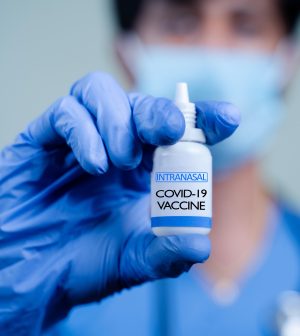- Could Your Grocery Store Meat Be Causing Recurring UTIs?
- Are You Making This Expensive Thermostat Error This Winter?
- Recognizing the Signs of Hypothyroidism
- 10 Strategies to Overcome Insomnia
- Could Artificial Sweeteners Be Aging the Brain Faster?
- Techniques for Soothing Your Nervous System
- Does the Water in Your House Smell Funny? Here’s Why
- Can a Daily Dose of Apple Cider Vinegar Actually Aid Weight Loss?
- 6 Health Beverages That Can Actually Spike Your Blood Sugar
- Treatment Options for Social Anxiety Disorder
First Needle-Free COVID Vaccines Get OK in India, China

WEDNESDAY, Sept. 7, 2022 (HealthDay News) – While researchers explore the possibilities of COVID-19 vaccines that don’t require an injection, public health officials in India and China have already each approved new needle-free versions for their citizens.
In India, regulators on Tuesday approved a nasal vaccine developed in the United States and manufactured by the company Bharat Biotech.
Meant for people who have not yet been vaccinated, it was not clear how well it works because the company has not yet released study results, although it has also applied for the spray to be used as a booster.
A timeline for the nasal spray’s rollout was also not available, the Associated Press reported.
“This step will further strengthen our collective fight against the pandemic” Indian health minister Mansukh Mandaviya said on Twitter.
The vaccine was developed by scientists at Washington University in St. Louis who licensed it to the Indian company. It delivers a copy of the coronavirus spike protein to the nasal lining, delivered using a harmless chimpanzee cold virus. Trials included two doses of the vaccine for 3,100 unvaccinated volunteers and a booster for 875 people who had already received two COVID shots.
In China, the needle-free vaccine is an inhaled version of CanSino Biologics’ existing COVID shot that’s meant to be a booster dose. The company said preliminary study results showed just one puff increased immune protection, but it was not clear if that meant improved effectiveness, the AP reported.
The Chinese vaccine uses a harmless human cold virus and was tested as a booster on people who had received COVID shots from another Chinese company.
A timeline for this vaccine’s rollout was also not known, the AP reported.
The interest in a shot-free vaccine is part of a strategy to improve protection against infection by placing the doses directly where the virus enters the body, such as in the nose or mouth.
In some low-income countries, using something other than a shot may also be easier for storage and delivery, Dr. Michael Diamond from Washington University told the AP. He helped create the spray licensed in India.
Nearly a dozen options are being tested globally, the AP reported. These include two inhaled vaccines.
The immune system has specialized tools to protect different sites of the body in different ways, Ashley St. John, an immunologist at Duke-NUS Medical School in Singapore, told the AP.
Advantages for a mouth spray vary depending on the size of the droplets, Dr. Vineeta Bal, an immunologist and professor at the Indian Institute of Science Education Research, told the news agency. Smaller droplets could travel deeper and reach the lungs, for example, whereas large droplets may settle in the mouth and parts of the throat.
“The advantage with nasal vaccines is that it may get rid of the virus before it has a chance to establish itself in the lungs and replicate,” Bal explained.
More information
The World Health Organization has more on COVID-19.
SOURCE: Associated Press
Source: HealthDay
Copyright © 2026 HealthDay. All rights reserved.










